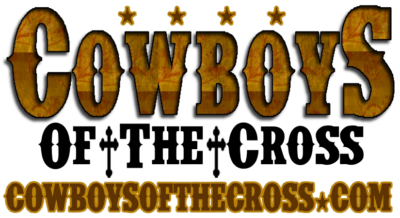By Jesse Horton / Cowboys of the Cross
We all have questions about how to know God’s will for our lives. We recognize our need to hear from God, but we’re unsure how to communicate with him. With Father’s Day approaching, I encourage all the men with families to lead them well in this area and as individuals, to rise up to the challenge of digging in and learning how to follow God’s direction.
The primary way God communicates with us is through the Scriptures. By Scriptures, we mean the 66 books of the Bible – 39 books in the Old Testament (OT) and 27 books in the New Testament (NT) (the word testament literally means covenant or promise). The first 5 books of the OT (Genesis – Deuteronomy) are referred to as the Torah, the Pentateuch, and the Law (of Moses). They reveal how God began his work of creation, man’s rebellion against God’s authority, and God’s intention to redeem mankind through Abraham and the nation Israel. God made an unconditional covenant with Abraham to bless all nations through him, and a conditional covenant with the nation Israel to fulfill the promises he made to Abraham through the nation if they would obey his commandments (or his Law). Among other topics, we learn much about the unapproachable holiness and power of God from these books.
The next 12 books (Joshua – Esther) are Israel’s recorded history as they received in part the fulfillment of God’s promises to Abraham. It also records their repeated distrust of God and their rebellion against him through the intermingling of their faith with the pagan nations around them which led them to worship idols rather than God. From these books, we learn many historical facts about the nation of Israel, but mostly we see God as faithful, patient, corrective, and redemptive toward his often-faithless people.
The next 5 books (Job – Song of Solomon) are called wisdom literature. These books often compare and contrast the flawed perspectives of mankind with the perfect wisdom of God. The Psalms do so in poetic and lyrical fashion while the Proverbs provide general truths for living a wise, safe, and successful life. It should be noted that these are not to be taken as commands that always have a good result but are the general precepts consistent with wise living that generally produce good results.
Our OT concludes with 5 books called the Major Prophets (Isaiah – Daniel) and 12 books called Minor Prophets (Hosea – Malachi). The differentiation between major and minor refers to length, not importance. These books were written and compiled at various times throughout Israel’s history and often represent a mixture of God’s correction of his rebellious people through trials of judgment, the promise and hope of God’s faithfulness in the midst of trials, and the restoration of those who endure faithfully with their hope set on God alone.
Throughout each of these books runs a so-called scarlet thread that expects and foreshadows the coming of God’s Messiah to initiate and fulfill a better promise (or covenant). Jesus is there in the OT; he asserted this himself (John 5:46) and fulfilled hundreds of OT prophecies about Messiah.
The NT begins with 4 gospels (Matthew – John) – the good news about Jesus. They are biographical theology, intended to connect Jesus with the coming of God’s kingdom to earth. Matthew was one of Jesus’ disciples, also called Levi. Mark appears historically in the book of Acts and was a partner in the gospel with the Apostle Peter, another one of the original 12. Mark wrote Peter’s first-hand account of Jesus. Luke was a doctor, an educated man. He joined the Apostle Paul in his missionary journeys as we learn from Acts and 2 Timothy. Luke wrote the gospel by his name and the book of Acts after careful examination of the facts and as a record of his experience with Paul. John is known as the disciple whom Jesus loved – another one of the original 12. While the first 3 gospels are known as Synoptics, John is called the Evangelist because his gospel is highly theological and written to make the point that Jesus is “the Christ, the Son of God” (John 20:31).
Next, the book of Acts written by Luke records the advancement of Jesus’ church throughout Jerusalem, Judea, Samaria, and the rest of the Roman empire. Importantly, it records the reception of the Holy Spirit by those who believed – even those who were not Israelites, the physical descendants of Abraham.
What follows are 13 letters (known as epistles) from the Apostle Paul. Paul was formerly known as Saul of Tarsus who persecuted Christians as blasphemers of true Judaism. His contribution to the NT is as unlikely as it is important. How can we explain the conversion of one of Jesus’ harshest critics into one of his greatest advocates apart from divine revelation? The first 9 letters are written to churches in specific regions. With the exception of Romans and Ephesians, they address specific situations and questions the early church faced. Romans and Ephesians are more general in nature, and therefore offer greater comprehensive insight into Paul’s theology. The last 4 letters are written to specific people, 3 pastors and one slave-owner. The 3 pastoral epistles (1 Timothy – Titus) provide insight into ecclesiology (church governmental structure and administration) in specific contexts. Philemon teaches us about reconciliation and relationships among Christians.
Hebrews is a more general letter whose author is unknown, though likely a close coworker in the gospel with Paul. Its title is derived from its audience – those of Hebrew descent and faith, and it is written to encourage and bolster their faith in Jesus the Messiah as the all-sufficient sacrifice for sin and the fullest revelation of God to mankind, and this in times of severe persecution where hopelessness and defection from the faith would be serious concerns.
The next 7 letters (or epistles) are general in nature and named by their authors (James, Peter, John the Evangelist, and Jude). James and Jude were brothers of Jesus, and Peter and John were Jesus’ two closest disciples. Therefore, these letters come from men who knew Jesus well, who saw his miraculous ministry, his crucifixion, his resurrection, and his ascension. These men had no doubt about the truth of who Jesus was and died as martyrs for that truth, so their testimony and teaching should hold great weight as we study.
The final book of the NT is the Revelation (no “s” at the end!). It is written by John the Evangelist in his old age, the record of a prophetic vision regarding the last days. The last days began when Jesus was crucified, so we see much overlap of John’s prophecy with the history of the world and specifically the church. It tells us what we can expect in the last days, culminating in the Last Day when the living and the dead are judged and sentenced to eternity in heaven or hell based on their acceptance or rejection of Jesus’ authority as Lord. It was not written for us to create timetables of the last days, but to instill hope in the persecuted church through the promise of eternal life for those who faithfully endure for the sake of knowing Jesus Christ.
WOW! That’s a lot! But how can we know what God is saying through the Scriptures unless we know what we’re reading? These 66 books were written by 40 different authors from different cultures, social, political, and geographic backgrounds and across the span of about 1,500 years, yet they all wrote without contradiction or error about the God of the universe and his promised Messiah. How? Divine inspiration. 2 Peter 1:21 says, “For no prophecy was ever produced by the will of man, but men spoke from God as they were carried along by the Holy Spirit.” The Bible you hold in your hand contains the very words of God to his people…to you! People often ask, “What is God’s will for my life?” It’s in the Bible. “What should I do when…?” It’s in the Bible. “Is it right or wrong to…?” It’s in the Bible.
I want to make this abundantly clear, though. Christian faith is not about knowing the Bible; it’s about knowing the God of the Bible and his Christ! It’s not about what you should do or shouldn’t do; it’s about who you know. When we know God – really know God – our doing will align with his will, his character, and his nature, because knowing God changes us into who he wants us to be.
I want to encourage you – especially dads – to begin to read the Bible with your family today for the purpose of knowing the God proclaimed by the Scriptures. Pay attention to how the Holy Spirit has spoken to you as you’ve read the descriptions above; is there a book or section of the Bible that piques your interest? Start there. If not, I might suggest reading the Gospel of Mark; it’s only 16 chapters and very terse. You could also read one Proverb and five Psalms each day and complete those two books in a month; your wisdom is bound to increase! The Gospel of John is a great place to turn after you’ve read one of the 3 synoptic gospels.
Read whatever strikes you, but make sure you have a little background (like what I’ve provided above) to understand what you’re reading, and make sure you read for the purpose of knowing God. He loves you. He wants a relationship with you, and this is how that relationship grows.
Draw a line in the sand today. Make knowing God through his word a primary goal in your life.


Recent Comments